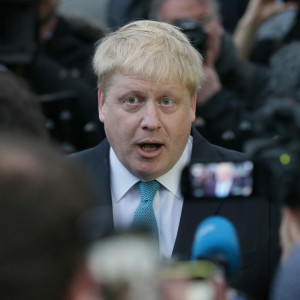Boris and The Donald. They have more in common than unruly hair.
London Mayor Boris Johnson has effectively anointed himself the leader of the campaign to end Britain’s membership in the European Union as a means to becoming prime minister. Donald Trump, real estate mogul and all-round loudmouth, has definitively assumed the title of front-runner for the Republican presidential nomination after winning another set of caucuses.
Americans who didn’t know Trump before — were there that many? — have had a chance during the presidential campaign to familiarize themselves with the man who denies he combs his hair over. The blond, mop-topped Johnson — he can credibly claim his distinctive hair is hereditary — isn’t a household name like Trump, or nearly as wealthy (few are). But he’s got more in common with the New York billionaire than many, Britons especially, might realize — or care to admit.
Both Trump and Johnson now have their moment, thanks to shameless opportunism, a keen sense of timing and a political environment that their current political parties shaped for years.
The 51-year-old Johnson can seem the embodiment of those British adjectives that make Americans chuckle when applied to a country brimming with aristocrats. But he is not barmy or batty, nor dotty, nor daffy.
“Boris Johnson: The Irresistible Rise,” a phenomenal, intimate look at the London mayor from the dean of British documentary filmmakers, Michael Cockerell, turns Johnson’s nutso public persona inside out to reveal a fiercely ambitious politician whose interest in sensible public policy is entirely coincidental. The bicycle-sharing system in downtown London became “Boris Bikes” after the London mayor took a wobbly ride on one. He got stuck on a zip line while waving the Union Jack. He hosted the world at the 2012 London Olympics. And he always manages to play the entertaining, endearing fool.
“As a general tactic in life, it is often useful to give the slight impression that you are deliberately pretending not to know what is going on,” Johnson told Cockerell.
Watching the antics of BoJo — the tabloid name that rhymes with “bozo” is entirely fitting — you find yourself searching for his basic humanity, and coming up short. If, in watching Trump, you can’t find much to redeem the constant stream of malice coming out of that unique, round-lipped snarl, with Johnson you look for something besides his enduring smirk. A question for both of them: Does your moral center extend beyond yourself?
Johnson has jumped into the fight over the future of the U.K. as the de-facto leader of “leave” faction, the group advocating Britain’s departure from the 28-nation European Union on the grounds that it pays too much for too little, that migrants come in and soak up British welfare benefits, and that — Johnson’s line — “Britons need self-rule.” It’s a line that sounds as much Irish Republican Army as John Locke. Johnson and his countrymen will vote on the question on June 23.
There isn’t much economic rationale for cutting the rest of Europe loose. One estimate predicts a 6 percent shrinkage of British GDP, the equivalent of a harrowing recession, even if spread out a few years. The country would have to negotiate new trade agreements with virtually every country in the world. Britain’s vaunted financial center in London wouldn’t have the access to European markets it has long taken for granted.
The irony of Johnson’s move is that he knows Brussels, the seat of the European Union, far better than most British politicians. He was a journalist there for the Daily Telegraph, a conservative London broadsheet whose readers ate up the mockery of the EU that Johnson gleefully delivered. He spoke heavily accented French with an excrement-eating grin while penning stories about — alleged — EU rules that required one-size-fits-all condoms, and classified snails as fish. (His reporting, Johnson grudgingly admitted in the documentary, was “a little bit over-egged.”)
Yet those stories helped put Britain where it is, choosing between the EU and a scatty, half-baked plan to go it alone. For years, the conservative press has hurled a steady stream of criticism at the EU, not all of it dignified.
The Conservatives, the party of Johnson and Prime Minister David Cameron, have always been split on the subject, with a good chunk wanting to leave the EU. Their skepticism became a campaign calling card, which over time made it fashionable to disparage the EU even if, in the end, you might find it a useful organization. Just as the Republican Party teed up Trump’s anti-immigrant message, Johnson’s own conservatives created the opening for him to assume leadership of the anti-EU camp.
A victory for Johnson’s camp in four months would knock Cameron out of 10 Downing Street lickety-split, since the prime minister — an old chum of Johnson’s at Eton, the famous prep school — has staked his career on winning the referendum. That would leave the leadership of the Conservatives in disarray at a time when Boris Johnson is Britain’s most popular politician.
Perhaps the main difference between Trump and Johnson in their aspirations is the system. Trump needs to win a nomination, and a general election. BoJo, who cannily took a seat in Parliament alongside the mayoral gig, must only win his party’s leadership; with a Conservative majority in the House of Commons, he would be elected prime minister.
Does he want to be prime minister? He abjures the possibility, but in Cockerell’s documentary, analogizes to the rough-and-tumble world of rugby that the toffs of Eton know so well: “If the ball came loose from the back of a scrum …”

